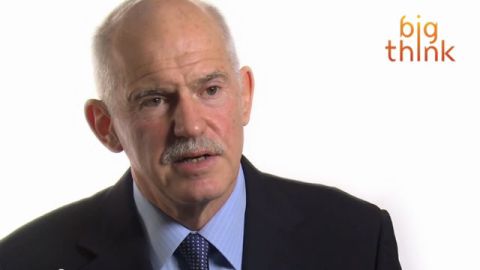Crowdsourcing Government: Wikilaws in the Cradle of Democracy

“Everybody has to be able to participate. This goes back to an ancient Greek concept that every citizen is useful, everybody needs to participate. Bring in critical thinking. Bring in creative thinking,” says George Papandreou, the former prime minister of Greece. Big Think met with Papandreou at the Global Education & Skills Forum to discuss democracy 2.0 in the country that first gave us the revolutionary system of government.
“I think what politicians and leaders need to always take into account is that first of all we need to continually have feedback and empower our citizens to feel that they own solutions,” he says. “This is, I think, a very democratic concept of course, but it’s not simply a democratic concept. I think it’s also a concept which allows for a society to grow, to feel cohesive, to feel that it actually develops deeper trust in where it’s going. And there has to be a continual give and take between the politician, the leader, and society.”
Papandreou has grown up around politics, and has seen history from the vantage point of being the son and grandson of popular former prime ministers. He served himself during a turbulent time for Greece’s economy, a crisis that shook Europe. “I think that what we are seeing today in politics is because of the flux, the changes, the amazing complexity, the possible crises that can be, you know, one day calm, the next day you have a financial crisis,” he says. “We need to have more participation and solutions. We need to use the potential of our societies.”
Education is the cornerstone of any democracy, as Papandreou points out. “Education plays a major role. But education alone will not be enough if a citizen doesn’t feel that he or she is able to use it. If you can’t give the opportunity for a person to participate, if a person doesn’t feel that he or she has a voice, they will say, why should I learn?” says Papandreou. “When I was prime minister, one thing I felt very important, particularly during the crisis, is we needed to give a voice to our citizens. So one way we did this: we used technology by saying, okay, every law that we are going to pass we will first put online and create sort of a Wikilaw process which would allow for citizens to comment, to edit, to change, to propose, and then that would come back to the government.”
The Wikilaw program facilitated greater civic communication. Since the Greeks brought us democracy, it only makes sense that their government would be on the forefront of crowdsourcing. Papandreou says he would check in with his government to discuss how they were listening to their citizens through Wikilaw. “I would ask, okay, what do we have through the participation of our citizens in this Wikilaw process. And I would ask the minister, what have you taken on board. What have you left out and why have you left it out? And, for example, in tax laws there were proposals and comments from citizens that the bureaucracy had never thought of. You see, there’s sort of a knowledge, the so-called wisdom of the crowd.”
For more from Papandreou’s discussion about technology innovation in government, watch a clip from our interview:





